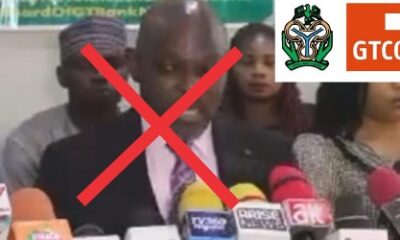The Central Bank of Nigeria on Sunday reduced the withdrawal fee charged for the use of other banks’ Automated Teller Machines from N65 to N35.
The N35 ATM fee according to the CBN should be imposed on customers after the third withdrawal within one month.
The new directive is part of the major highlights of the new Guide to Bank Charges released by the CBN on Sunday.
It also removed Card Maintenance Fee on all cards linked to current accounts and also asked banks to charge a maximum of N1 per mille for customer induced debit transactions to third parties and transfers or lodgments to the customers’ account in other banks on current accounts only.
The guidelines also pegged the Advance Payment Guarantee to a maximum of one percent of the APG value in the first year and 0.5 percent for subsequent years on contingent liabilities.
The CBN warned banks to ensure full compliance with the new guidelines adding that any bank that violates the provisions of the guidelines would be sanctioned.
It reads in part, “Financial Institutions are to note that any breach of the provisions of this Guide carries a penalty of N2,000,000 per infraction or as may be determined by the CBN from time to time.
” Failure to comply with CBN’s directive in respect of any infraction shall attract a further penalty of N2,000,000 daily until the directive is complied with or as may be determined by the CBN from time to time.”
On debit card charges, the new guideline stipulates that a one-off charge of N1, 000 applies to the issuance of cards, irrespective of card type (regular or premium).
The same one-off charge of N1,000 applies for the replacement of debit cards at the customer’s instance for lost or damaged cards. In the same vein, upon expiry of existing cards, customers are to pay the same one-off charge of N1, 000 irrespective of card type. However, no charge shall be required for pre-paid card loading/unloading.
According to the policy, the current NIP charges apply to use of Unstructured Supplementary Service Data (USSD), purchase with cash-back will attract a charge of N100 per N20, 000 subject to cumulative N60, 000 daily withdrawal.
Also, for cards linked to a savings account, a maintenance fee has been reduced to a maximum of N50 per quarter from N50 per month amounting to only N200 per annum instead of N600.
Besides, there will be no more charges for reactivation or closure of accounts such as savings, current and domiciliary accounts while status inquiry at the request of the customer (like confirmation letter, letter of non-indebtedness and reference letter) will now attract a fee of N500 per request.
On CAMF, the guideline said this would be applicable only to current accounts in respect of customer-induced debit transactions to third parties and debit transfers/lodgments to the customer’s account in another bank. It prohibits CAMF on savings accounts.
It also prescribes charges permissible for Other Financial Institutions and non-bank financial institutions, in order to align with market developments.
The guideline states: “To guard against excess, unapproved or arbitrary charges by banks and other financial institutions, the guide stipulates a penalty of N2,000,000 per infraction or as may be determined by the CBN from time to time for financial institutions that breach any provision of the guide.
“The guide also emphasized that failure by any bank to comply with CBN’s directive in respect of any infraction shall attract a further penalty of N2,000,000 daily until the directive is complied with or as may be determined by the CBN from time to time.”
It also directed banks to log every complaint received from their customers into the Consumer Complaints Management System (CCMS) in addition to generating a unique reference code for each complaint lodged, which must be given to the customer. Failure to log and provide the code to the customer, it added, amounts to a breach and is sanctionable with a penalty of N1, 000,000 per breach.
This guide, which replaces the guide to Charges by Banks and Other Financial Institutions issued in 2017, takes effect from January 1, 2020, and maybe reviewed from time to time to reflect changes in the business environment.
The CBN urged financial services providers and their customers to acquaint themselves with the provisions and be properly guided.

 BIG STORY2 days ago
BIG STORY2 days ago
 BIG STORY2 days ago
BIG STORY2 days ago
 BIG STORY3 days ago
BIG STORY3 days ago
 BIG STORY3 days ago
BIG STORY3 days ago
 BIG STORY2 days ago
BIG STORY2 days ago
 BIG STORY3 days ago
BIG STORY3 days ago
 BIG STORY2 days ago
BIG STORY2 days ago
 BIG STORY3 days ago
BIG STORY3 days ago

























